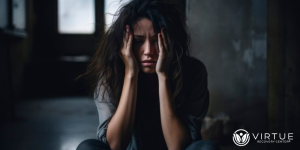Key Takeaways
- A lot of women are now taking more than one substance at a time, including alcohol, cocaine, and prescription medicines.
- There are specific drug abuse treatment programs for women in Killeen, Texas, who have sophisticated patterns of addiction.
- Austin and other nearby cities provide medical detox clinics that assist individuals in safely stopping using drugs, particularly when they are using alcohol and stimulants at the same time.
- To get healed, women require trauma-informed treatment, dual diagnosis support, and therapies that are made just for them.
- Getting care immediately once is vital since polydrug usage may make health issues worse.
Introduction
There are millions of women in the US who have drug use disorders. The hazards and treatment requirements are significantly severe when more than one substance is taken at the same time. Someone who consumes two or more addictive substances at the same time or one after the other is said to be using polydrugs. Women commonly use alcohol, cocaine, benzodiazepines, and opioids (Wang et al.).
There are specialist centers for substance abuse treatment in Killeen, Texas, that serve women with more than one addiction in a manner that works for them. You have a chance to become well if you go through a comprehensive course of treatment, which might start with a detox program and continue with outpatient or residential care in Killeen.
This blog discusses why women use more than one medicine, the dangers of using more than one drug, and how individualized therapy may help individuals achieve changes that persist.
What Does It Mean To Take More Than One Drug, And Why Is It So Dangerous?
Taking more than one substance isn’t only a means to explore new things; it may also be a sign that someone has a more serious mental or emotional disorder. Women who have been through trauma, anxiety, or depression may take one substance to “balance out” another or combine medications to make the high greater or prevent withdrawal symptoms. Women often use these medicines together:
- Cocaine and alcohol (which enhances the risk of heart attack and creates cocaethylene, a hazardous byproduct)
- Benzodiazepines and opioids (which might make it hard to breathe)
- Stimulants and sedatives (to help you sleep and have more energy)
Using more than one drug at a time is exceedingly risky and may lead to:
- More likely to take too much
- Side effects and combinations with other drugs that are hard to anticipate
- More likely to have a heart attack, seizures, or liver damage
- Made mental health issues worse, such as anxiety or psychosis
- More likely to be wounded or assaulted by mistake
Mixing drugs makes them more dangerous and more challenging to quit taking; therefore, you need to see a doctor.
Why Do Women Use More Than One Drug?
Women typically have different motives and societal factors that make them utilize drugs than males. According to the National Institute on Drug Abuse (NIDA), here are some common reasons why women use more than one drug:
- Self-medicating after trauma or abuse
- Handling stress from being a parent or having troubles in a relationship
- Using medications to obtain energy and alcohol to relax
- How to cope with mental health issues that develop at the same time, such as PTSD, anxiety, or eating disorders
On a biochemical level, women also handle drugs and alcohol differently. They may get addicted more quickly and have harsher withdrawal symptoms, particularly when they drink alcohol or use stimulants. Because of these elements, substance abuse treatment in Killeen, Texas, has to take into consideration concerns that are distinct to each gender.
What Services Are There In Killeen For Women Who Use More Than One Drug?

There are a variety of evidence-based options in Killeen, Texas, that may assist women who are addicted to more than one substance. Most of the time, these programs have:
- Groups for therapy for men and women
- How to treat dual diagnosis
- Behavioral therapy
- Involvement of family
- Making plans for aftercare
Some programs in Killeen partner with medical detox clinics in Austin to assist women in safely going from being in acute withdrawal to getting treatment.
How Important Is Detox For Those Who Use More Than One Drug?
Detox is a vital initial step, particularly for women who consume alcohol and use cocaine or benzodiazepines at the same time. You might have seizures, heart difficulties, or other dangerous issues that could kill you if you stop taking these medications on your own.
Women who need alcohol detox or other drug recovery frequently start their treatment at places that are medically supervised. There, trained specialists keep an eye on vital signs, help with withdrawal symptoms, and prepare patients for additional therapy.
Here are some crucial elements to look for in a safe detox program:
- Care from doctors 24 hours a day
- Using medicines to aid in alleviating withdrawal symptoms, such as benzodiazepines for alcohol withdrawal or beta-blockers for cocaine withdrawal
- Help with cravings, anxiety, and trauma via therapy.
- It’s easy to get inpatient or outpatient treatment in Killeen.
Can Women Who Are Addicted To Cocaine And Alcohol Get Better Together?
Yes. Both cocaine addiction and alcohol use disorder are challenging to cope with, but women may get well from both if they follow a treatment plan that takes both into consideration.
A lot of individuals use alcohol and cocaine together; therefore, therapy has to concentrate on how the two substances affect each other, such as how they stress the heart, change moods, and make people want to binge. A good strategy for recovery has:
- Learning about some drugs
- Individual treatment to find out what motivates you
- How to cope with urges
- How to handle stress and things that set you off
- Group sessions with other women
How Is Women’s Treatment Different?

Women who are getting over a polydrug addiction frequently have to cope with greater shame, more responsibilities as caregivers, and more complex feelings than men do. Gender-specific therapy in Killeen handles these issues directly. Most programs have:
- Focus on healing from trauma
- Help in being a parent and taking care of kids
- Therapy that helps people feel strong
- Taking care of your body, your nutrition, and yourself
Many women require assistance establishing trust, creating boundaries, and figuring out who they are when they aren’t addicted. A loving, woman-centered approach brings about permanent transformation.
Conclusion
Polydrug misuse is not only dangerous for you, it can kill you, particularly for women who have to cope with trauma, being a parent, relationships, and mental health problems all at once. Substance abuse treatment in Killeen, Texas, assists women who are addicted to alcohol, cocaine, and other substances in a manner that is suited for them.
Virtue Recovery Center, Killeen, helps women who are battling with polydrug usage by giving them loving, all-around care. We also offer detox programs in Austin, ensuring each stage of the procedure is tailored to your recovery needs. Call 866-843-0545 now to chat to an admissions expert and start on the road to a better, healthier future.
Frequently Asked Questions
What is the most risky combination of medications for women?
Alcohol and benzodiazepines or alcohol and cocaine are terrible for you since they may affect your heart and central nervous system.
Do women require gender-specific therapy for addiction?
Yes. Women often become addicted for various reasons and have diverse experiences with it. Programs that are just for one gender provide safer, more supportive environments.
Can I start treatment in Killeen if I need to detox first?
Yes. Many clients begin their treatment in Austin and then simply switch to inpatient or outpatient programs in Killeen.
How long does it usually take to get help for drug abuse?
The duration of therapy might vary, but it usually lasts between 30 and 90 days and involves follow-up care to assist in keeping people from relapsing.
Do programs for those who are addicted to more than one substance involve mental health care?
Yes, for sure. A lot of women who are attempting to quit using more than one substance also require treatment for anxiety, PTSD, or depression. They need to deal with both difficulties to become well.
Resources:
- Wang, Linwei, et al. “Polydrug Use and Its Association with Drug Treatment Outcomes among Primary Heroin, Methamphetamine, and Cocaine Users.” International Journal of Drug Policy, U.S. National Institutes of Health, https://www.ncbi.nlm.nih.gov/pmc/articles/PMC5681890/.
- National Institute on Drug Abuse. “Sex and Gender Differences in Substance Use Disorder Treatment.” NIDA, U.S. Department of Health and Human Services, https://nida.nih.gov/publications/research-reports/substance-use-in-women/sex-gender-differences-in-substance-use-disorder-treatment.
- Zhou, Jiani, et al. “Treatment of Substance Use Disorders Among Women of Reproductive Age by Depression and Anxiety Disorder Status, 2008–2014.” Journal of Women’s Health, U.S. National Institutes of Health, https://pmc.ncbi.nlm.nih.gov/articles/PMC8893023/.
- About the Author
- Latest Posts
Gigi Price holds licenses as a Master Social Worker and Clinical Drug Counselor. She completed her master’s degree in Social Work at Texas State University. Over the last decade, Gigi has been dedicated to utilizing evidence-based practices to enhance patient care and treatment planning, resulting in positive, long-term outcomes for patients and their families. Her passion lies in creating a treatment environment where professionals collaborate to bring about positive change and provide a safe, trustworthy therapeutic experience. Patients can be confident in receiving top-quality care under her leadership.
In her role as the Clinical Director of Virtue Recovery Houston, Gigi conducted research to identify the most effective approaches for treating patients with acute mental health diagnoses, PTSD, and Substance Use Disorder. She then assembled a team of skilled clinicians who could offer various therapeutic modalities, such as Cognitive Behavioral Therapy (CBT), Dialectical Behavioral Therapy
(DBT), Acceptance and Commitment Therapy (ACT), Somatic Exposure, Eye Movement Desensitization and Reprocessing (EMDR), and Cognitive Processing Therapy (CPT). Gigi takes pride in overseeing the development and implementation of Virtue Houston’s Treatment Program, which includes two specialized therapeutic curricula tailored to the unique needs of individuals struggling with mental health issues, addiction, and PTSD.












